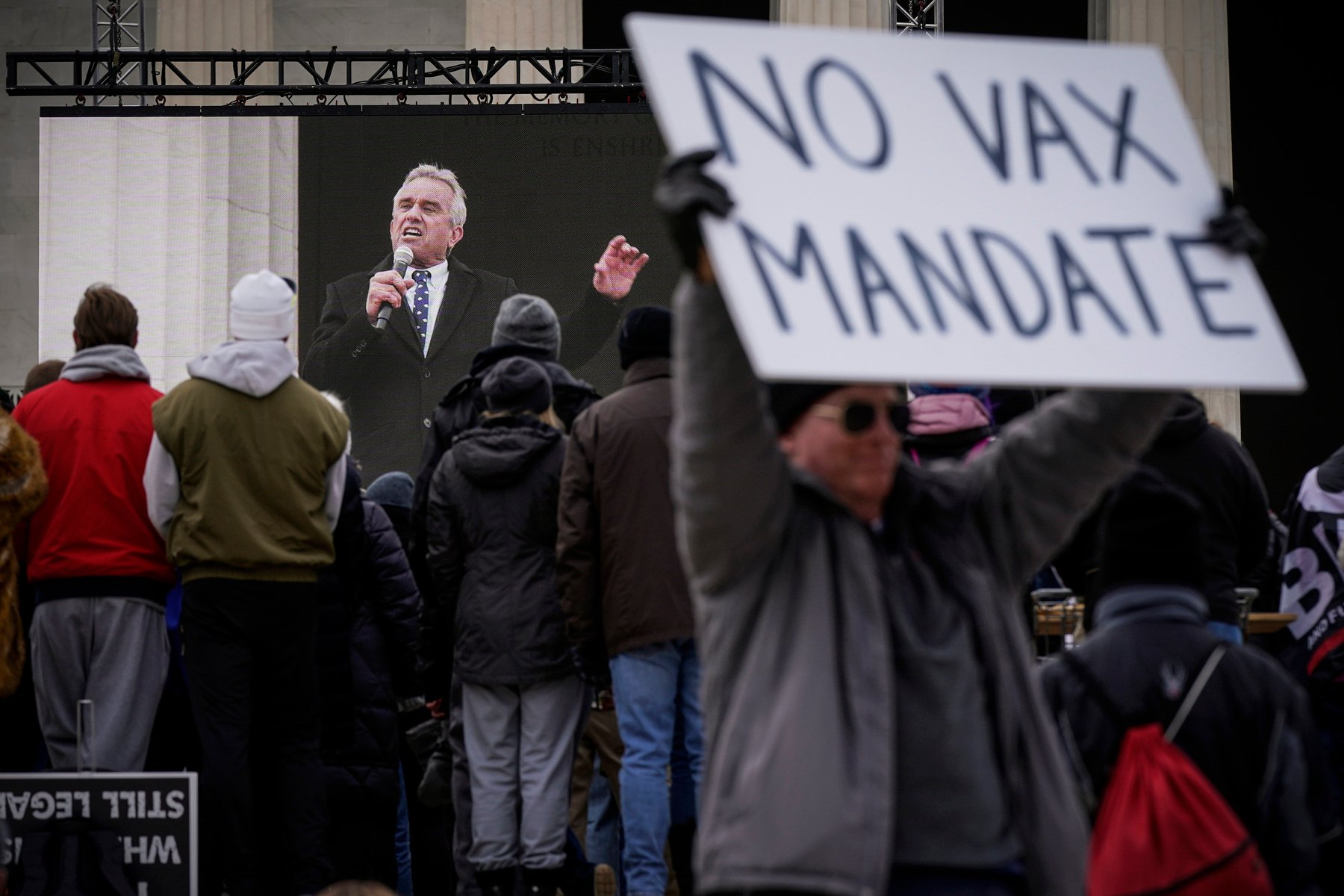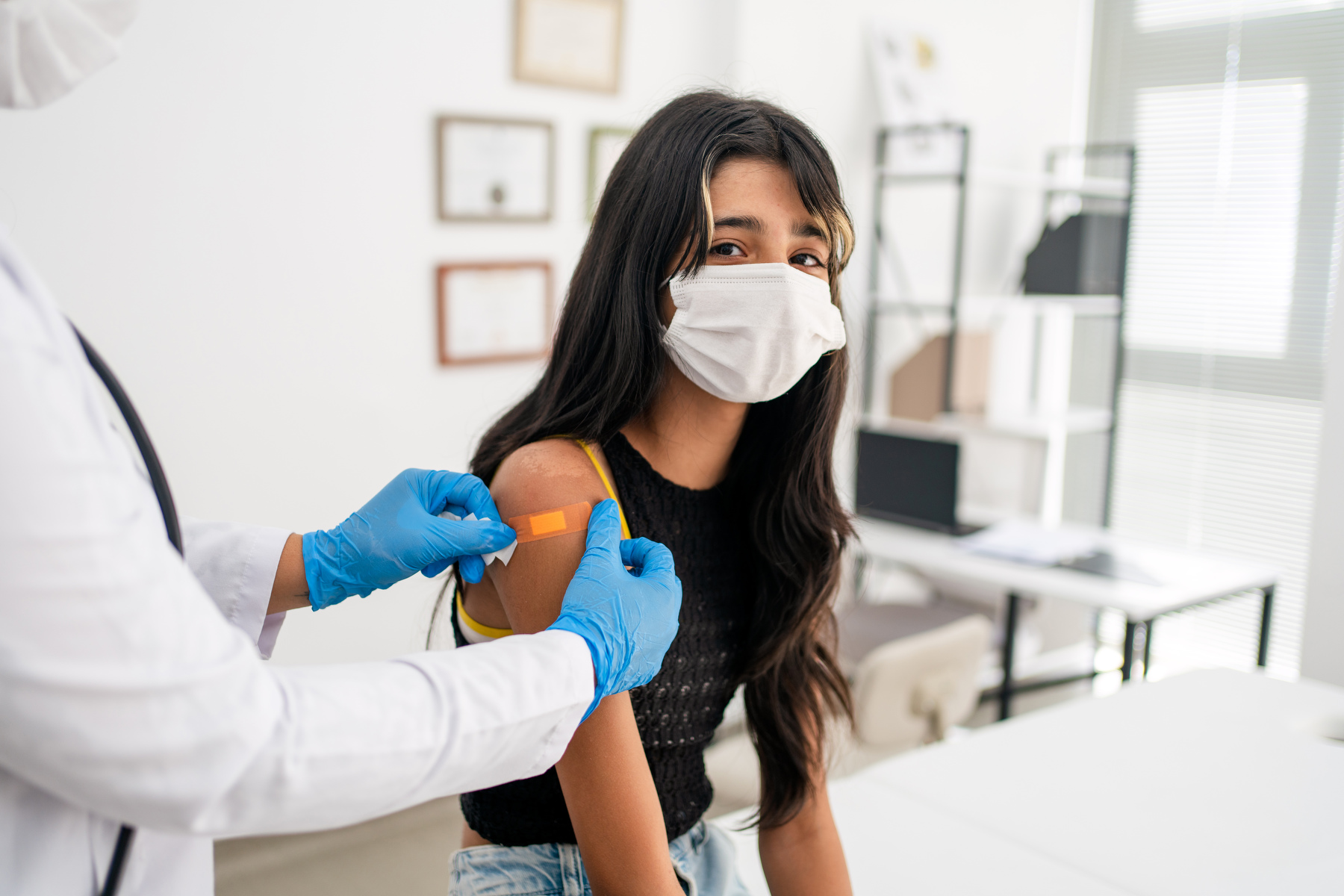Colleen Thomas’ son was born missing a part of his immune system. The Indiana mother didn’t know that immediately, but there were signs. The little boy was always sick — constant congestion and respiratory infections. Thomas had to hold a breathing mask over her son’s face as he slept and wheezed.
“That was just for a cold,” Thomas recalled. “It was horrible.”
Thomas’ son was 3-years old when he was diagnosed with an immunodeficiency that made him susceptible to severe illness if he was exposed to respiratory infections.
“Once he was diagnosed by an immunologist, it all became very clear that he’d been really lucky, that he had only caught mild viruses and colds — even though it wasn’t mild for him,” she said. “He’s very lucky he didn’t come into contact with something like measles or pertussis.”
“There was a point at which the doctor looked at me and said, ‘I don’t know if he would survive those,’” Thomas added. “That is scary.”
Even before his diagnosis, Thomas’ son got all his childhood vaccinations. Now, with the news of a measles outbreak in Texas — coupled with the Senate confirmation of Robert F. Kennedy Jr, an anti-vaccine activist, as head of the nation’s health department — Thomas worries about the future of vaccine research, messaging and hesitancy in the country.
For parents of kids and adult children with immunocompromised systems, the consequences of fewer people vaccinating themselves and their children could be life-threatening — particularly for young children, children and adults with medically complex needs and disabilities, and older Americans. Often the people advocating most on their behalf are parents, or members of the sandwich generation who have young children and also care for aging parents. Many of them are women, who are credited with making family health decisions.
Thomas’ son, who is now 12 and much healthier, for a long time relied on chance that enough people around him — at places like school, the park, and even the grocery store — were vaccinated. High rates of vaccination can achieve herd immunity, the indirect protection of a community from an infectious disease. It can also be achieved through natural infection, but it leads to more severe illness and even death.
Medical experts worry about the impact on herd immunity if more people decline vaccinations. The percentage of people who need to be immune from a disease varies, but herd immunity for measles needs to be about 95 percent.
“The good news is that the vast majority of adults in the U.S. are vaccinated,” said Dr. Elizabeth Jacobs, a cancer and nutritional epidemiologist who has studied vaccine hesitancy, in an email. “Over time, however, as vaccination coverage continues to drop, we can expect to see more outbreaks of diseases that are preventable.”
Herd immunity protects not just people with weakened immune systems, but also people who can’t get vaccinated yet like newborns.
“These are already issues that we’ve been working to address by creating herd immunity, so it protects those people that need this most because of whatever reasons they can’t get a vaccine,” said Dr. Regina Davis Moss, who advocates for equitable health outcomes through In Our Own Voice: National Black Women’s Reproductive Justice Agenda. She previously worked for the federal health department, Kaiser Health and the American Public Health Association.
“The beauty of living in the United States is that we do have freedom, we do have choice,” she said. “But that doesn’t mean it doesn’t have consequences — that doesn’t mean that other people don’t get hurt.”

Concerns about vaccine hesitancy come as childhood vaccination rates are declining, and there is a rise in the so-called “medical freedom” movement, which essentially rejects government interference in health choices.
“I feel like what gets lost in this discussion is parents who also want to make sure that their communities and their child’s school are healthy,” said Rekha Lakshmanan, chief strategic officer at The Immunization Partnership, a Texas-based nonprofit that educates the public and state lawmakers on the importance of vaccinations. “Those parents, too, have a right to make sure that we’re living in a society and in a community that is free from disease. Their rights are getting lost in all this discussion.”
Thomas said the population of people who are anti-vaccine — meaning they will not accept medical science on the safety of vaccines — is smaller than people realize.
“Most people are not that way,” she said. “But that tiny group is very loud, and so I have to be the counter voice.”
Pennsylvania resident Erica Finkelstein-Parker’s adult son, Djino, was diagnosed with liver cancer in 2021 at the age of 15. He received oncology treatments for a year, which culminated with a liver transplant. Today, the 19-year-old is on immunosuppressant medication that has weakened his immune system and makes him more susceptible to severe illness.
Finkelstein-Parker makes sure her family is up to date on vaccines. But it won’t be enough for her son if there are increasing instances of widespread infection among unvaccinated people. The measles outbreak in Texas — among mostly children — is in a county with one of the lowest vaccination rates in the state.
“I can’t tell you how angry I get when I hear people say, ‘It’s my right to not vaccinate,’ she said. “It’s not somebody’s right to endanger somebody else.”
Childhood vaccination rates have been declining since around the start of the pandemic, a period of rising disinformation and misinformation about vaccine safety that experts contend influenced some parents to be more skeptical about vaccines. (The nation’s vaccines are safe, effective and highly regulated.)
“Refusing vaccines is withdrawing from the community health bank without depositing anything back into it,” Jacobs said. “A lot of people think that choosing not to vaccinate will only affect their own children, but this is not true.”
During the pandemic, an anti-vaccine nonprofit that Kennedy founded was linked to widespread messaging against the COVID-19 vaccines, according to an investigation by The Associated Press. At the height of the pandemic, the same group asked the federal government to rescind approval of the COVID-19 vaccines, claiming the health risks outweighed the benefits.
People who are anti-vaccine consciously challenge the safety of vaccines despite research that confirms they are safe. Then there are people who lack enough information about existing vaccine safety data, but are willing to change their minds. Lakshmanan said that the public should not equate these groups as the same, since the latter is open to changing their minds.
“They’re just genuinely trying to decipher and swim through the vast amount of information to help inform them as to how they want to approach vaccines for their children,” she said.
Keesha Middlemass is a political science professor at Howard University who has examined the history of racist medical research, misinformation and its impact on vaccine hesitancy among Black people. Middlemass said it’s important to acknowledge that American society is facing a fractured media ecosystem that will make vaccine education more difficult moving forward.
“People don’t trust government,” she said. “The lack of trust in government, plus the disinformation in this echo chamber of information, leads to vaccine hesitancy.”
During his Senate confirmation hearings, Kennedy was repeatedly asked about his history of anti-vaccine activism and related views. He refused to say that vaccines don’t cause autism. (They do not.) Kennedy also claimed support for the measles vaccine and the polio vaccine. During one of his first remarks as secretary, Kennedy indicated an interest in reviewing the childhood vaccine schedule in order to address chronic disease.
As HHS secretary, Kennedy will oversee the research and approval of vaccines but will not have authority to revoke vaccine mandates that were put in place by statehouses around the country. But some legislatures and state officials have begun to dismantle that safety net.
In Louisiana, the surgeon general there announced this month that the state would stop promoting mass vaccination. Lawmakers in several states have filed bills aimed at expanding the types of reasons that parents can use to exempt their children from vaccines.
Now with RFK Jr. being confirmed, Lakshmanan said she won’t be surprised if vaccine hesitancy gets more air time on social media and other mediums.
“That’s going to just create even more confusion for parents,” she said.
Lakshmanan said it’s important that people call out bad faith messaging on vaccines, including from medical professionals and doctors within the halls of state legislatures.
“We should hold lawmakers, policymakers and decisionmakers accountable when they try to normalize misinformation about vaccines,” she said. “At the end of the day, it’s about protecting kids and putting kids over the politics around this issue.”
Middlemass said the way forward will be a vaccine education, but it can’t be a one-size-fits-all approach.
“Vaccine education needs to be culturally relevant. A single campaign for everybody is not appropriate,” she said. “There’s got to be a huge push for vaccine education through a public health lens that connects with different communities. You need credible messengers. You need to be able to approach parents where they are, versus telling them what they must do.”
Finkelstein-Parker is observing all of this with frustration. She promotes vaccines through a social media account, writes to her congressional leaders and plans on getting more politically involved locally. For her, it’s personal.
She adopted a child, a daughter named Emmalee, in 2005. Emmalee died in 2011 at age 8 from complications related to a measles infection she contracted prior to her adoption, in her home country of India. Finkelstein-Parker’s daughter’s case was rare, but emerging measles outbreaks in the United States shows what’s at stake for other families.
“I am a vaccine advocate because for people walking around unvaccinated, if they get measles as an adult, they’re going to be really sorry. If their kids get it, they land in the hospital,” she said.
Today, Thomas said her son is thriving after years of surgeries and treatment. She volunteers for an Indiana vaccine advocacy organization that does outreach to parents and lawmakers. Thomas wonders about the families and friends in her community whose children are as vulnerable as her son was as a toddler and young child. She implored mothers in particular to seek science-based information.
“If they’re not going to take the time to go to the doctor and really listen and ask questions, then they’re going to run with this misinformation,” she said. “And they’re not doing it because they’re trying to be negligent or hurt their kids. They’re trying to do the very best they can for their kids, and we’re just victims of this manipulation.”







